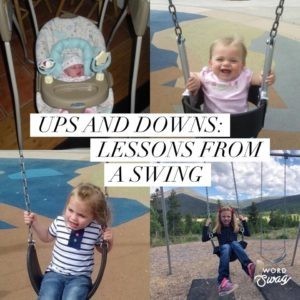“Will you push me, Mama?”
Lying on the couch after work, mindlessly scrolling social media when my sweet nine year old daughter says, “Will you push me on the swing, Mama?”
I’m a pediatric speech/language pathologist and my job is AMAZING, but it’s also very demanding and zaps me mentally and physically by the end of the day. An introvert at heart, I need alone time to recharge and refuel. Needless to say, pushing her on the swing was not on my agenda for the night. However, as I looked into her bright eyes sparkling with hope, I put my phone down and asked her to give me five minutes. Enthusiastically she ran to the clock, figured out how long five minutes would be, and then bounded out the door.
“Will you push me, Mama?”
There was a time my daughter with apraxia couldn’t say “Mama” and had to go to speech therapy to learn it. Once she had words, she had to learn how to put them together to make a phrase because she also has a developmental language disorder. There was a time she had to go to speech therapy to learn how to add the /s/ to /s/ blend words, words in which an /s/ is next to another consonant as in “swing.” There was a time she had to learn how to use verb tenses correctly and once she understood and used verb tenses correctly, there was a time she had to then practice “interrogative reversals” in order to ask questions correctly. Those days seemed so long. The struggle seemed so long. Yet here she stood, effortlessly doing all those things as though she never spent hours in therapy offices learning how to do them. Here she stood asking to be pushed on the swing, something most kids were doing while she was working hard to find her voice.
“Will you push me, Mama?”
Though my daughter can pump her legs herself now and swing, there was a time she had to spend hours in occupational therapy and physical therapy before her core strength could even support the act of sitting up on and pumping a swing. Then, once she was strong enough, she needed more therapy to get the coordination of the movements down. As she got taller, she then needed to learn how to change the motor plan and move her ankles out to the side so her feet wouldn’t hit the ground. Yet, here she stood, able to do all of these things now but still asking me to push her. She’s nine years old. We are getting close to her never asking me this question again and the gravity of that sunk in. Would this be the last time she asked me to push her? My mind flashed back to her beautiful smile when she is swinging. She literally came out of the womb and hogged the swing in the nursery. The nurses all laughed and mused at the baby who was only happy in the swing. It never stopped there. I have numerous pictures, too many to count, of her swinging in various ages of her life.
“Will you push me, Mama?”
I thought about how swings go up and down and up and down and how Ashlynn smiles and giggles through it all. I thought about how swings are a lot like life in that way. Ashlynn has a lot of challenges. She has a genetic mutation called BCL11A that has caused numerous disabilities and her life is anything but easy street. If anything, it’s more like the swing in that there are ups and downs, successes and challenges. Through it all though, she smiles.
“Will you push me, Mama?”
I thought about all the areas I’ve had to push her. Sometimes I wonder if I pushed too hard. Did I let her be a kid enough? Will she only remember speech therapy, occupational therapy, physical therapy, and tutoring? Nights struggling through homework? Nights struggling through activities of daily living that are so hard for her, such as brushing her teeth or getting dressed, because I know she needs to learn to do them for herself?
“Will you push me, Mama?”
So on this cool summer evening in June, tired from work and craving alone time, I got up and pushed her for an hour that night in the backyard. We laughed and giggled and made up games. I reveled in the fact my daughter still wanted me to push her, and I prayed to find a balance in the future of pushing her not a breaking point, but further and further to her potential. Oh, and making sure we find time to keep smiling and laughing along the way.
Laura Smith is a mother to two beautiful children, one of which was diagnosed with a rare genetic mutation that caused a multitude of learning challenges. She is a Denver based Speech/Language Pathologist now specializing in Childhood Apraxia of Speech. To learn more visit SLPMommyofApraxia.com
Related video:
This post comes from the TODAY Parenting Team community, where all members are welcome to post and discuss parenting solutions. Learn more and join us! Because we're all in this together.

